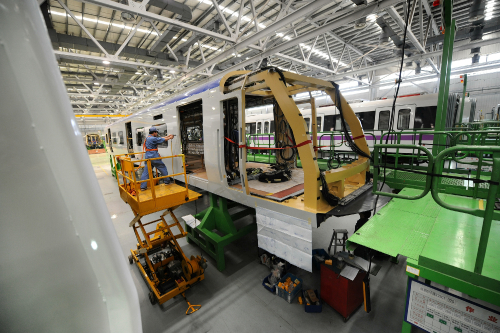 |
|
CEMENTING COMPETITIVENESS: A technician works in an assembly shop of CSR (LONG HONGTAO) |
Why the merger?
Since last October, Chinese Premier Li Keqiang has promoted Chinese-made high-speed trains to a number of countries such as Australia, Britain and the United States. However, the overlap of CNR and CSR's businesses has greatly fueled cutthroat competition between the two.
Li Jin, Vice President of China Enterprise Reform and Development Society told The Beijing News that mergers of state-owned enterprises usually take the form of a high-performing company acquiring another moribund company, and the case of CNR and CSR is quite different, for the two are neck and neck.
The move aims to change the in-fighting situation and reduce waste of resources, so that Chinese bullet train manufacturers can have a louder say in the overseas market and spread the Chinese brand and standard on a larger canvas. For this reason, the merger will quickly weld the two into a community of shared interests, according to the Chinese Listed Companies Public Opinion Center.
In addition to the elimination of price competition, the move will also propel management and technological progress. Wang said that the subordinate factories of CNR and CSR may undergo a restructuring to focus on the research and development of different high-speed trains, such as those running in highland and severely cold regions. If the two continue going out of their way to vie for construction projects, stagnant technological progress and low prices will easily breed corruption.
"If the two train giants team up with each other, their bargaining power will be significantly enhanced," said Sun, noting that since CNR and CSR are skilled in the manufacturing of locomotives and motor train units respectively, the two will complement each other's advantages after joining hands.
As Wang Zhigang, Assistant Director of the Research Center of the State-owned Assets Supervision and Administration Commission of the State Council, argued that the merger is not just a corporate reorganization, but an attempt to promote the "Chinese high-speed train" on the international stage.
"The competitiveness of Chinese-made high-speed trains lies in their standard and brand as well as their speed," said Wang.
Email us at: dengyaqing@bjreview.com
China CNR Corp. Ltd.
Incorporated on June 26, 2008, CNR has been listed on the Shanghai Stock Exchange since December 2009 and on the Hong Kong Stock Exchange since May 2014.
As a leading company in China's rolling stock industry and an important member of the worldwide rail transportation equipment manufacturing industry, CNR directly holds 26 subsidiaries established on the mainland and three subsidiaries incorporated in Hong Kong, South Africa and the United States.
CNR focuses primarily on the manufacturing and refurbishment of rolling stock, including high-speed multiple units, locomotives, passenger coaches, freight wagons, rapid transit vehicles, and railway engineering machinery. CNR also engages in the manufacturing of mechanical and electric products, clean energy and environmental protection equipment. In addition, its business also encompasses trading of raw materials, finance leasing of rolling stock, machines and equipment, and a project management contracting service for urban rail and other related projects with the aim of providing future cities with systematic solutions.
China CSR Corp. Ltd.
Incorporated on December 28, 2007, CSR went public in Shanghai and Hong Kong in August 2008, and has established 17 wholly owned and shareholding subsidiaries in 10 provinces and cities.
CSR boasts a complete system of independent development, massive manufacturing and standard service of railway locomotives, passenger trains, freight wagons, bullet trains, metro vehicles and relevant parts.
As China's largest metro vehicle manufacturer, CSR owns China's largest electric locomotive R&D and manufacturing base, a globally leading bullet train R&D and manufacturing base, an industrially leading large-power diesel locomotive and diesel engine R&D and manufacturing base, a domestically leading high-grade bus enterprise, a globally leading rail wagon R&D and manufacturing base, and three designated mass transit vehicle localization enterprises.
CSR uses proprietary rail transit equipment technologies to develop and expand the market for extended products, including electric vehicles, wind generation equipment, automotive parts, marine crankshafts and diesel engines, large-power semiconductor devices and construction machinery.
(Source: CNR & CSR) | 